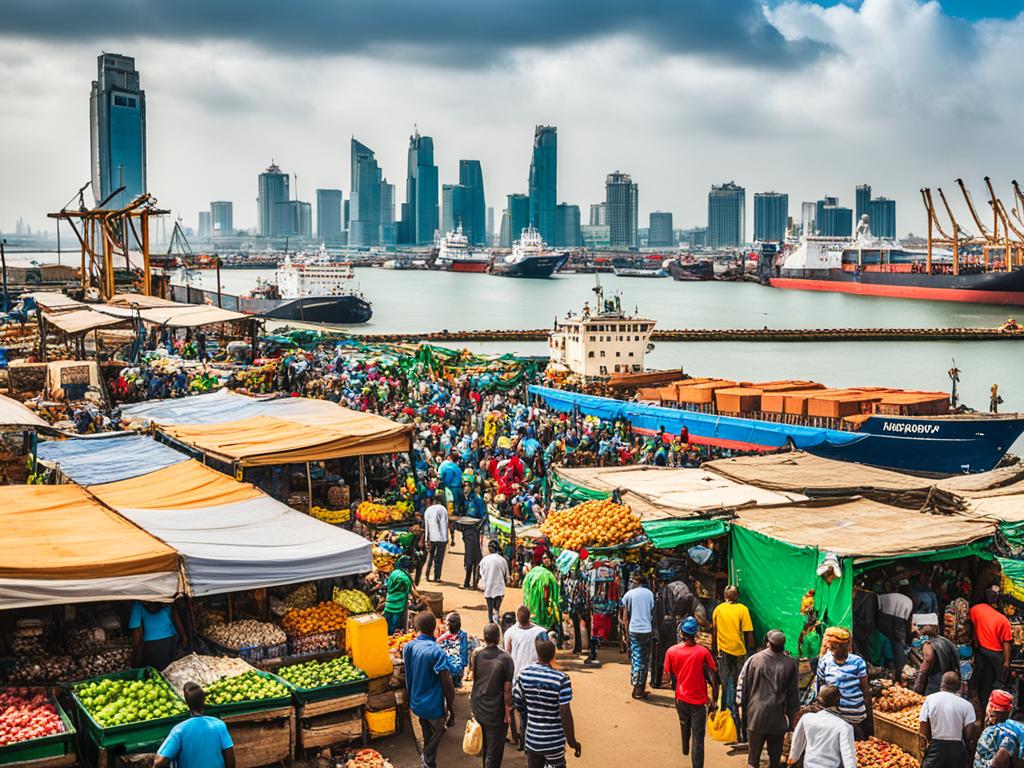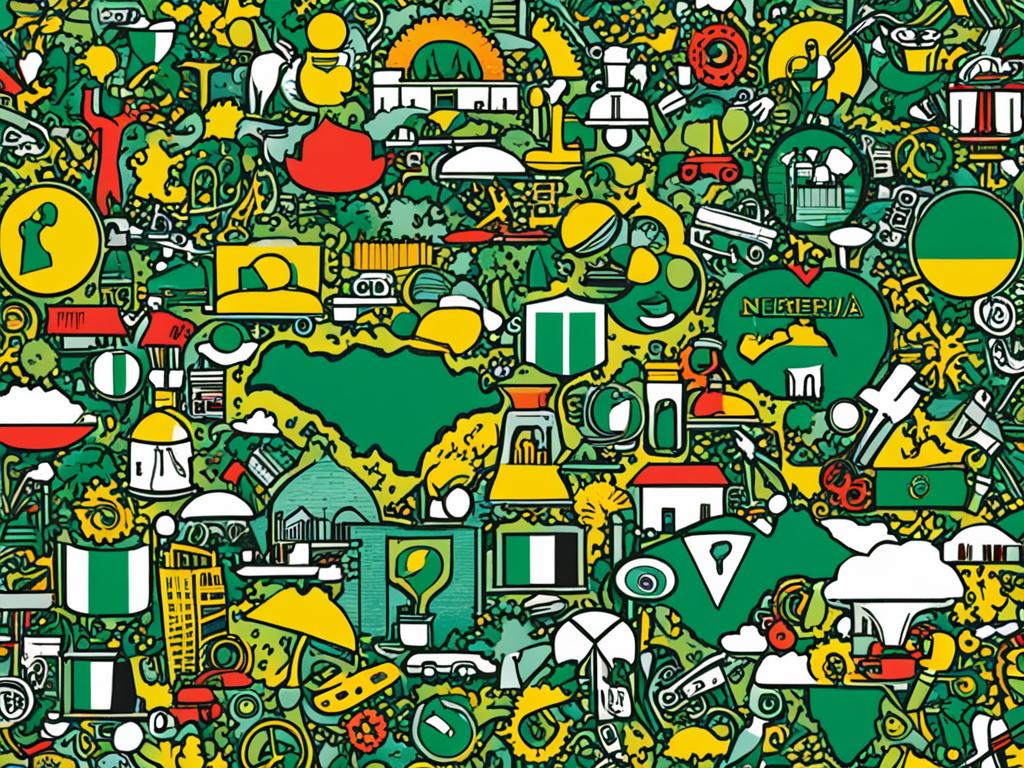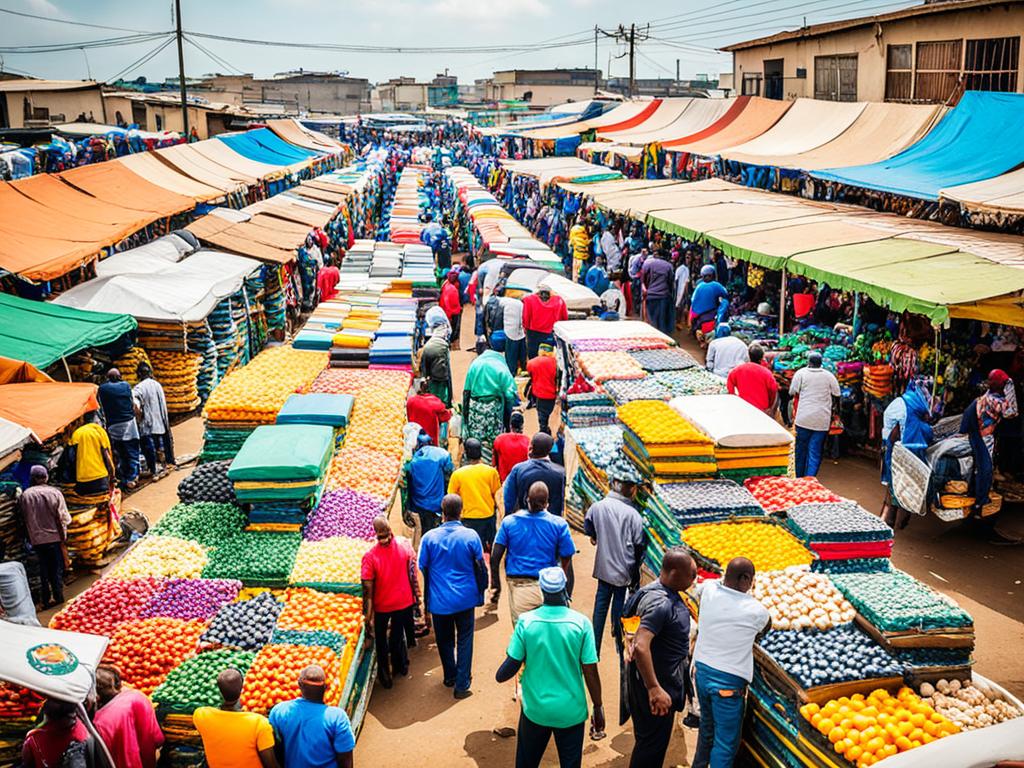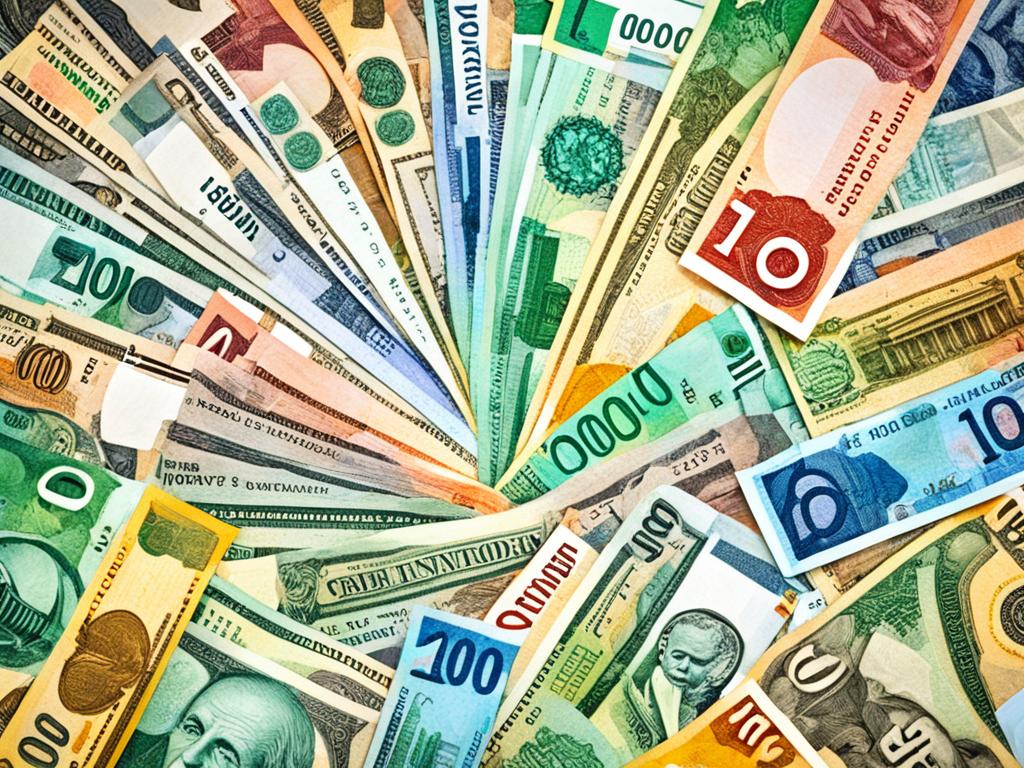
Nigeria Economy: Growth, Challenges, and Opportunities
Nigeria is the biggest country in Africa, with a complex economy. It has seen both great growth and big challenges lately. Its economy is key to Africa’s economic growth and stability. Nigeria economy is strong because of its big oil reserves. These reserves have driven its GDP growth. But, relying too much on oil makes it sensitive to global oil price changes. It needs to grow other parts of its economy.

Nigeria also has a strong agriculture and services sector. It has a growing population, which brings both chances and challenges for its leaders. The country is working to fix its infrastructure, political issues, high joblessness, and income gaps.
This article looks into Nigeria’s economy deeply. It talks about its growth, main sectors, challenges, and new chances. By understanding Nigeria’s economy, we see the big potential and challenges of Africa’s biggest market.
Nigeria’s Economic Landscape
Nigeria is the most populous country in Africa, with a diverse and dynamic economy. It has changed a lot over the years. At the center of its economy are key sectors that have greatly influenced its growth and development.
Nigeria Economy: Key Economic Sectors
The oil and gas industry is a big part of Nigeria’s economy. It makes up a large part of the GDP and export earnings. But, the government is working hard to make the economy more diverse. They’re focusing on sectors like agriculture, manufacturing, and services.
Agriculture is a big deal in Nigeria, employing many people. It adds a lot to the GDP. The country produces a lot of cash crops like cocoa, palm oil, and rubber. It also grows staple foods like yams, cassava, and rice.
Manufacturing is smaller than oil and gas but very important. It includes food processing, textiles, cement production, and the automotive industry.
Nigeria Economy: GDP Growth Trends
Nigeria’s GDP growth has changed a lot over time. This reflects its efforts to diversify the economy and global economic conditions. Recently, the economy has started to grow again after a slow period.
| Year | GDP Growth (%) |
|---|---|
| 2018 | 1.9% |
| 2019 | 2.2% |
| 2020 | -1.8% |
| 2021 | 3.6% |
The COVID-19 pandemic hit Nigeria hard, causing GDP to drop in 2020. But, the economy is bouncing back. GDP growth went up in 2021.

Challenges Facing the Nigerian Economy
Nigeria’s economy faces many challenges that slow its growth. One big issue is the infrastructure deficiencies. Roads are in bad shape, power is unreliable, and clean water is hard to get. These problems make it hard for businesses to run and increase costs.
Another big challenge is the high levels of corruption. Corruption in both public and private sectors is a big problem. It leads to poor management of funds and hinders the government’s efforts to fix economic issues and invest in important projects.
Unemployment is also a big worry, especially for young people. There are not enough jobs and limited education and training. This leads to social problems and hurts the economy’s growth potential.
Lastly, making the economy more diverse is crucial. Nigeria depends too much on oil and gas, making it unstable. Moving into sectors like agriculture, manufacturing, and technology is key for lasting growth.
| Challenge | Impact | Proposed Solutions |
|---|---|---|
| Infrastructure Deficiencies | Increased cost of doing business, hindered business operations | Increased investment in infrastructure development, public-private partnerships |
| Corruption | Undermined government’s ability to address economic problems, mismanagement of public funds | Strengthening anti-corruption measures, improving transparency and accountability |
| Unemployment | Social unrest, underutilization of human capital | Investing in education and vocational training, promoting entrepreneurship and small business development |
| Economic Diversification | Vulnerability to oil price fluctuations, limited growth in other sectors | Policies and incentives to promote diversification, investment in non-oil industries |
To overcome these challenges, Nigeria needs a strong plan from the government, private sector, and international partners. Fixing infrastructure, fighting corruption, creating jobs, and diversifying the economy are key steps. These actions will help unlock Nigeria’s economic potential and ensure sustainable growth and development.

Nigeria Economy: Opportunities for Growth
Nigeria is facing economic challenges but also has chances for growth and diversification. The country’s leaders want to move beyond oil and gas. They aim for a stronger, more balanced economy.
Diversification and Industrial Development
The focus is on making the Nigerian economy more diverse. The government is focusing on agriculture, manufacturing, and technology. These sectors can create more jobs, increase productivity, and lessen oil dependence.
Nigeria has a lot of land and a good climate for farming. It’s set to become a big player in crops and livestock. Efforts are being made to improve farming, support small farmers, and increase food production.
The manufacturing sector also has big growth chances. The government is making it easier for local and foreign companies to invest. With its resources and people, Nigeria wants to be a key manufacturing center. This includes textiles, food processing, and light engineering.
The tech sector is also full of potential, thanks to a young population and better digital access. Investing in digital innovation, software development, and e-commerce can help diversify the economy. It can also create jobs and make Nigeria a top tech spot in Africa.
By taking advantage of these chances, Nigeria can grow sustainably. It can lessen its oil dependence and build a stronger, wealthier economy for its people.

| Sector | Opportunities |
|---|---|
| Agriculture | Vast arable land, favorable climate, modernization of farming practices, support for small-scale farmers |
| Manufacturing | Value-added production, reduction of imports, leveraging natural resources and human capital |
| Technology | Digital innovation, software development, e-commerce, youthful population, digital infrastructure |
Foreign Investment and Trade
Nigeria’s economy draws in foreign investors because of its rich natural resources, big market, and key location. The country aims to boost foreign direct investment (FDI) in areas like infrastructure, manufacturing, and tech.
Nigeria Economy: Attracting Foreign Direct Investment
The Nigerian government has set up policies and projects to make FDI easier. These include:
- Creating special economic zones with tax breaks and better infrastructure
- Making investment processes simpler and cutting down on paperwork
- Investing in key sectors like farming, energy, and transport
- Strengthening laws to protect foreign investors
Thanks to these efforts, Nigeria has attracted a steady flow of foreign investment. Big companies from all over the world have set up shop here. The nigeria economy has gained a lot from foreign investment in projects like building roads, railways, and power plants.
| Year | Foreign Direct Investment (FDI) in Nigeria (Billion USD) | Exports (Billion USD) | Imports (Billion USD) |
|---|---|---|---|
| 2020 | 2.4 | 35.1 | 45.1 |
| 2021 | 3.1 | 41.2 | 50.3 |
| 2022 | 3.8 | 46.4 | 55.7 |
But, Nigeria still depends too much on imports and needs to diversify its exports beyond oil and gas. Joining regional and global trade deals, like the African Continental Free Trade Area (AfCFTA), could help grow the nigeria economy and attract more foreign investment.

Nigeria Economy: Economic Policies and Reforms
The Nigerian government has launched several economic policies and reforms. These aim to tackle the country’s economic issues and boost sustainable growth. They focus on making the monetary and fiscal policies stronger. They also aim to improve the business environment and encourage diversification of the economy.
The Central Bank of Nigeria (CBN) has worked to stabilize the naira exchange rate and control inflation. It has also made efforts to increase credit for the private sector. The CBN has introduced policies to attract foreign investment and make foreign exchange more accessible to businesses.
The government has brought in tax reforms to reduce dependence on oil and improve tax collection. It has also invested in infrastructure like power, transportation, and telecommunications. This is to make the country more competitive in the economy.
FAQ
What are the key economic sectors in Nigeria?
Nigeria’s economy is mainly driven by the oil and gas industry. It makes up a big part of the country’s GDP. Other key sectors are agriculture, manufacturing, and services.
What are the recent GDP growth trends in Nigeria?
Nigeria’s GDP has seen ups and downs in recent years. Growth and slowdown periods have happened. The oil and gas sector and global commodity prices greatly affect its economy.
What are the major challenges facing the Nigerian economy?
Nigeria faces big challenges like poor infrastructure, high corruption, and high unemployment. It also needs to diversify its economy beyond oil and gas.
What are the opportunities for growth in the Nigerian economy?
Nigeria has big growth chances in sectors like agriculture, manufacturing, and technology. The government aims to diversify the economy and boost industrial growth to lessen oil dependence.
How is Nigeria attracting foreign direct investment?
Nigeria is trying to draw more foreign direct investment, especially in infrastructure, manufacturing, and tech. It has set up policies and initiatives to make the business environment better for foreign investors.
What are the key economic policies and reforms being implemented in Nigeria?
Nigeria’s government is pushing through various economic policies and reforms. These include monetary and fiscal policies, and structural reforms. They aim to tackle economic issues and encourage sustainable growth.


